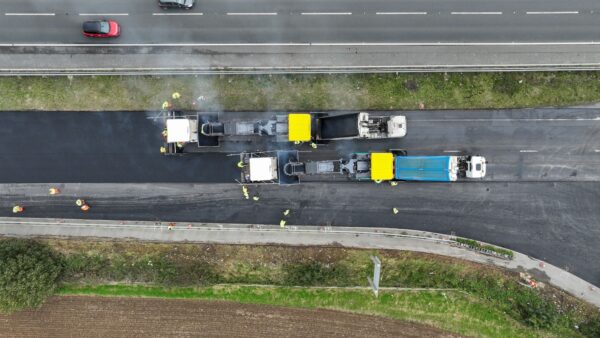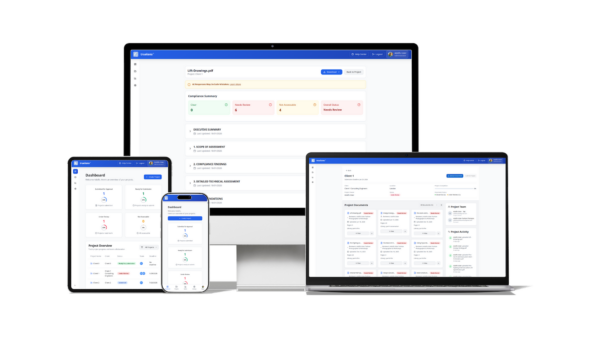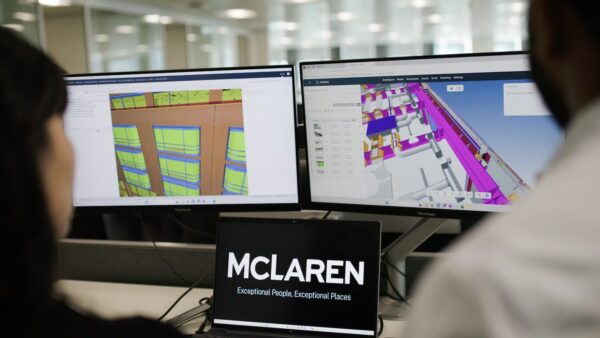
AI skills training in construction must be practical and combine digital simulations, onsite coaching and blended modules that align with net-zero priorities, a new report from Skills England states.
The government agency’s report, AI skills for the UK workforce, analyses AI upskilling needs, barriers and opportunities across 10 sectors. It also introduces tools to support employers and training providers. The report was authored by Dr Nisreen Ameen from Royal Holloway, University of London.
Focusing on construction, Dr Ameen states: “Despite AI’s potential to enhance safety, sustainability and productivity across infrastructure and housing projects, the sector remains one of the least digitally mature. AI uptake remains constrained by workforce digital literacy and limited integration into vocational pathways.”
She groups the most pressing AI skill needs in construction into three domains.
First, technical AI skills, including:
- using drones for site mapping;
- interacting with AI-supported project planning tools; and
- understanding data from BIM systems.
Second, non-technical AI skills, such as:
- interpreting AI output and applying it in onsite decisions; and
- communicating change across teams.
Third, responsible and ethical AI competencies, such as:
- understanding the environmental effects of automation;
- ensuring ethical use of surveillance tools such as site monitoring drones; and
- embedding inclusive design thinking into sustainability-oriented projects.
Training: patchy and poorly integrated
At present, training across all of these domains is “patchy and poorly integrated into national construction qualifications or apprenticeships”, says Dr Ameen.
The report highlights these sector-specific challenges to AI skills upskilling:
- digital exclusion among the oldest workers, the trades, and firms in rural or economically disadvantaged regions; and
- most existing AI training is not tailored to construction or provided in accessible, onsite formats.
To address these issues, workers need training designed for their specific jobs and locations. Research participants emphasised their preference for modular, flexible learning formats that integrate digital and AI tools into real-world construction contexts, particularly for roles such as forepersons, retrofit coordinators and planners.
Partnerships between employers, training providers and regional green skills initiatives should aim to embed AI training into practical provision models using digital simulations, onsite coaching and blended modules that align with net-zero priorities, Dr Ameen states.
She adds: “Developing inclusive CPD modules for both new entrants and existing workers can also support a more equitable and sustainable adoption of AI technologies. Workforce development strategies should ensure that the benefits of digital innovation are distributed across all tiers of the construction industry. They should not only aim to upskill individuals, but also support employers in embedding AI tools responsibly.”
Tools to help
The Skills England report comes with an employer AI adoption checklist, AI skills framework and an AI skills adoption pathway model.
Four weeks ago, the Construction Leadership Council published its Developing Digital Competency in the Built Environment report, which set out a framework for digital competencies.
Last year, the CIOB Innovation and Digital Advisory Panel developed and published its AI Playbook. The panel is now developing a Digital Programme Management Office Playbook, which is expected to be published next year.
David Philp, chair of the CIOB Innovation and Digital Advisory Panel, said: “The panel welcomes the report. The CIOB AI Playbook highlighted many additional AI use cases across the asset lifecycle, especially in operational stage – including how we make better use of the built assets we already have.
“However, to truly unlock the benefits of AI in a mindful, ethical and transparent manner, we must emphasise the foundational need for up-skilling and training in the context of basic data literacy and good data governance across the entire asset lifecycle and industry at all levels. These educational building blocks are essential for transparent decision-making and will empower the industry to leverage AI full potential.”















